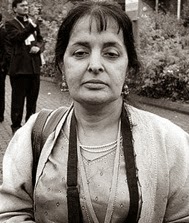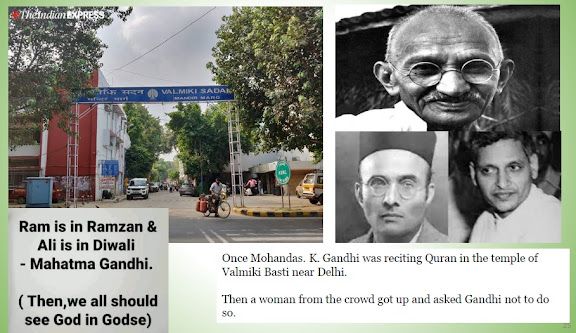Other side - An Imaginary Interview with Vidhya Subramanian
Brief Profile:
Vidhya
Subramanian, presently Associate Editor of The Hindu - is now Winner of Ramnath
Goenka Excellence in Jourlalism Award for the Best
Commentary and Interpretative Writing for 2010.
She is a PhD Research Scholar at the Zakir Husain Centre
for Educational Studies, Jawaharlal Nehru University, New Delhi.
Her previous assignments:
·
Reporter
with The Indian Express in Chennai in 1981 and then
Correspondent from Bombay and then Lucknow
correspondent between 1988 and 1990.
·
Editorial
Team of The Times of India in 1994.
She joined The Hindu in 2004, and has been writing
political editorials for the paper, regular commentary pieces, as well as
continuing her reportage, particularly during elections. Ms. Subrahmaniam is a
well-regarded expert on the electoral politics of the Hindi belt. She has
written extensively on the politics of communalism, social justice, party
politics dynamics, democracy and civil liberties.
Our Winged Reporter
- Pavithran having his common sense, sincerity, courage and above all valuing
truth irrespective person or position or power happened to read Vidhya’s recent
article published in The Hindu under the head The divide that never was
The said article was aimed to question and answer
the following allegations of both Modi and Advani:
Modi: India would have been a different and better
country had Patel been the first Prime Minister in place of Nehru
Advani: In 1948, there were irreconcilable
differences between Nehru and Patel on sending troops into Hyderabad and at one
point, Nehru called Patel a Total communalist.
From the above observations of Modi and Advani, Vidhya
had drawn the following inferences using her ‘excellence in journalism’:
Ø Advani is painting Nehru as
something of a villain vis-a-vis Patel.
Ø Advani is of the view that
Nehru constantly quarrelled with Patel and usurped the latter’s rightful place
in history.
Ø Advani is pointing out that
Patel himself resented Nehru’s dominance of India and its history.
Vidhya
then puts a question to herself - What is the truth? and then presents two
documents to prove her points.
The
two documents are:
- Tributes paid by Patel to Nehru on Nehru’s 60th birthday - on November 14, 1949 - Quoted to prove the regard and affection Patel for Nehru.
- Nehru’s statement within an hour of Patel’s death on December 15, 1950 to Parliament - Quoted to prove that Patel was Nehur’s friend and colleague on whom Nehru could invariably rely, as a tower of strength which revived wavering hearts when were in trouble.
Vidhya
concluded her essay by stating that Patel was Nehru’s lifelong friend and
guide.
Pavithran
concedes that it is the prerogative of any independent journalist like Vidhya to
arrive at her own conclusions, but, those conclusions should be fool proof to
withstand the test of scrutiny. Unfortunately, the documents on which her
conclusions were based could not bear the stamp of unquestionable authority.
Hence Pavithran
had flown to Chennai and could interview Vidhya to get into the bottom of the
issue and also to present his point of views.
Photo and narrations as published in the
article: IN HIGH REGARD: Nehru and Patel often disagreed, and furiously so. But
such was the beauty of the relationship that they rarely kept a secret from
each other. Photo: The Hindu Archives
Pavithran
entered Vidhya’s Chamber at The Hindu Office, Chennai with a bouquet.
Pavithran:
(Presenting the bouquet) Congratulations for getting the award for Excellence
in Journalism.
Vidhya:
Thank you. But, your E-Touch magazine seems to have a different perception
about my ability. You could not laud my article published in The Hindu - titled
‘The forgotten promise 1949’.
Pavithran:
Yes, Vidhya. Again, your recent article - ‘The divide that never was’ is also not
convincing and rather it is confusing. To be honest, always your evidences fall
short of expectations and are not strong enough to face scrutiny.
Vidhya:
How can you say that, Pavithran?
Pavithran:
Patel and Nehru were great leaders of India - First Deputy Prime Minister and
First Prime Minister. Patel was in office for 3 years and 4 months only. Your
quote of Patel was his tribute paid to Nehru on his 60th birthday -
i.e. on 14-11-1949. Normally, no one will attribute bad qualities at the time
of birthday greetings. Same holds good for the condolence message statement of
Nehru placed at Parliament on the death of Patel on 15-12-1950.
Vidhya:
Why not? Have you not noticed Patel’s copious praises showered on Nehru - such
as Idol of the nation, hero of the masses, upholder of our faith and the leader
of our legions etc.?
Pavithran:
While Patel statement about Nehru was Message of Greetings, Nehru’s statement about
Patel was Message of Condolences. Normally, None will quote such messages as
evidences to prove their points, as these messages and statements will not be a
balance sheet of persons involved in view of the special occasions on which
these were uttered. Rather one will only high light the best sides of persons
concerned in view of those solemn occasions. These are rudimentary courtesies
expected from such personalities. If Vidhya can quote or rely only on these
statements, then Vidhya will get another award for ‘Emotional Journalism’ as
well, if there is any such award instituted even over shadowing her recent
award for ‘Excellent Journalism’!
Vidhya:
Then, by this, do you want to take back the bouquet?
Pavithran:
Never, Vidhya. Actually, I expect you to buttress your inferences with some
historical instances as done by Advani. I had my own reservations about your
inferences, as even here Advani had never doubted the personal friendships
between Patel and Nehru. Patel’s struggles to get the timely political supports
from Nehru on those crucial and critical periods where timely and decisive
actions were warranted thereby creating a gap or vacuum in their political
friendships are all proverbial.
Vidhya:
My complaints and arguments are that the present political pundits like Advani
and Modi are bent upon to paint a picture of disharmony between Patel and Nehru
- i.e. The divide that never was.
Pavithran:
Differences between Nehru and Patel were grave, deep and decisive, but, these
had not divided them into separate camps - I agree. Though credits should go to
both - more to Patel - that is my inference. When Vidhya can have her
inferences, can I not nurture one?
Vidhya:
Of course.
Pavithran:
Issue is not that Patel and Nehru are at each other’s throats, but, their
differences on crucial matters had resulted in indecisions leading to avoidable
crises and delays. You yourself had admitted that they had disagreed and their
disagreements were even furious. Their differences had not ended in dividing
them - no body is disputing that statement. But for that, as pointed out by me,
credits should be given more to the Patel’s cool patience rather than furious
temperamental Nehru. Both evidences quoted by you will lose their value, as the
statements were meant for special occasions. Vidhya! You are silent on the
issue of Nehru calling Patel as ‘Total Communal’ - thereby immobilising Patel
from taking any action as a Home Minister. The delay in taking the military
action on Hyderbad is a historical fact and equating these two, one can easily
surmise that Patel could not take appropriate timely action in the absence of
Nehru agreeing to his proposal.
Photo and narration as published in the
article: Facsimile reproductions of the cover, and part of two inside pages
where Sardar Patel pays tribute to Jawaharlal Nehru on his 60th birthday, which
form part of a commemorative volume, Nehru: Abhinandan Granth, that was brought
out on the occasion. Courtesy: Nehru Memorial Museum and Library
Vidhya:
Do you mean to say whether Nehru should agree to what all Patel wanted to
pursue even without demanding facts and figures and assessing pros and cons?
Pavithran, please do not forget in the event of any wrong decision taken rather
than the delayed decision, the entire blame will be on the shoulders of the
Prime Minister. Caution in such surcharged issues is essential and careful
considerations and discussions and even disagreements were not questioned by
Patel. I feel that Patel and Nehru were at their best in dealing such
situations viewing them in an unbiased way.
Pavithran:
Here again you are airing your views without giving concrete examples. When the
actors such as Rajaji, Menons and Military Officials were on the side of Patel,
Nehru could not have courage to give decisive and timely orders. “The divide
that never was’ was because both Nehru and Patel were patriotic citizens of
India and hence their political differences had played no havoc.
Vidhya:
We are pole apart. Still I thank you for analyzing my article thoroughly and
for sharing your views and opinions with me.
Pavithran: Thank You.
(Pavithran flew back to his E-Touch office to publish his interview with Vidhya.)







Comments